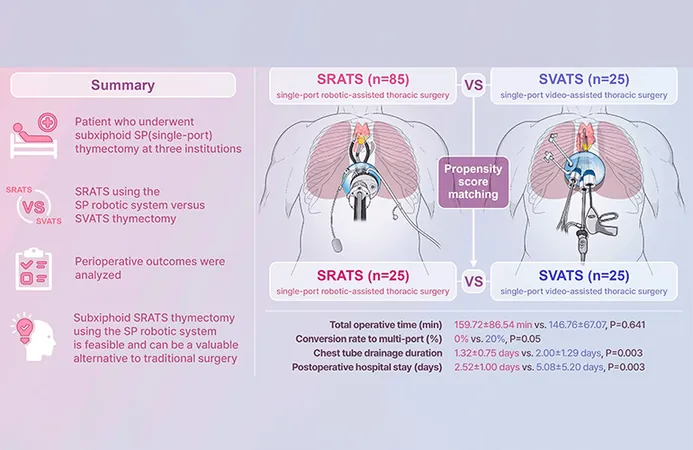
Revolutionary Findings in Robotic Thymectomy: A Leap Towards Surgical Precision!
2024-11-10
Author: Wei
Groundbreaking Study Overview
A groundbreaking study from the Department of Thoracic and Cardiovascular Surgery at Korea University College of Medicine has unveiled promising results regarding the effectiveness of single-port robotic thymectomy, positioning it as a potential new standard in minimally invasive thoracic surgery.
Research Findings
In this comprehensive research, the team meticulously compared the perioperative outcomes of 110 cases of robotic thymectomy performed using a single-port robotic system against those of conventional video-assisted thoracic surgery (VATS) thymectomy conducted between November 2018 and May 2024. Remarkably, every robotic thymectomy procedure was executed without the necessity for conversion to median sternotomy—a more invasive surgery—while an astonishing 98% of patients experienced no major complications.
Expert Opinions
Lead author Prof. Jin-Wook Hwang expressed optimism about the global recognition of Korea's advancements in this field, stating, “This research offers an opportunity for our country’s single-port robotic thoracic surgery to be acknowledged worldwide. We anticipate even greater results from single-port robotic thoracic surgery moving forward.”
One of the key findings highlighted by the research is the absence of conversions to multi-port surgery, reaffirming the efficiency of the single-port method. Additionally, the study noted that the duration of chest tube placement averaged just 1.32±0.75 days, and hospital stays were reduced to an average of 2.52±1.00 days—substantially shorter than traditional methods.
Collaborative Efforts and Future Studies
Prof. Jun-Hee Lee, another lead author, emphasized the significance of these findings, affirming that “single-port robotic thymectomy can transcend the limitations faced by conventional techniques.” The collaborative efforts of the Korea University Medicine team—comprising esteemed professors Jun-Hee Lee, Hyun-Koo Kim, Jin-Wook Hwang, and Jae-Ho Chung—have illuminated the safety and efficacy of this cutting-edge procedure.
Prof. Jae-Ho Chung noted the significance of these findings, stating, “Our thoracic surgery departments have produced remarkable results that underscore the safety and efficiency of single-port robotic thymectomy. We are committed to further clinical studies to ensure this technique can be safely extended to more patients in need of thoracic surgery.”
Broader Applications and Future Implications
The implications of this research extend beyond thymectomy; the team at Korea University Medical Center is also exploring single-port robotic techniques in lung cancer and esophageal cancer surgeries. These minimally invasive approaches not only enhance patient safety but could potentially revolutionize surgical protocols across various conditions.
As Prof. Hyun-Koo Kim remarked, “This research opens new frontiers for the future of single-port robotic surgery. Our persistent pursuit of innovation aims to elevate the quality of life for a broader range of patients.”
Conclusion
In summary, the Korea University team’s pioneering work sets a new trajectory for minimally invasive surgery. Their commitment to advancing robotic surgical techniques promises to transform the patient experience and establish new standards in thoracic surgery. What more can we expect from this innovative field in the coming years? Stay tuned for future breakthroughs!



 Brasil (PT)
Brasil (PT)
 Canada (EN)
Canada (EN)
 Chile (ES)
Chile (ES)
 España (ES)
España (ES)
 France (FR)
France (FR)
 Hong Kong (EN)
Hong Kong (EN)
 Italia (IT)
Italia (IT)
 日本 (JA)
日本 (JA)
 Magyarország (HU)
Magyarország (HU)
 Norge (NO)
Norge (NO)
 Polska (PL)
Polska (PL)
 Schweiz (DE)
Schweiz (DE)
 Singapore (EN)
Singapore (EN)
 Sverige (SV)
Sverige (SV)
 Suomi (FI)
Suomi (FI)
 Türkiye (TR)
Türkiye (TR)